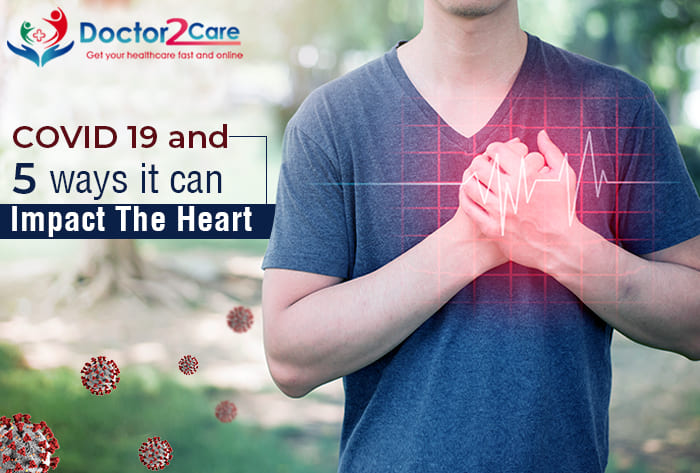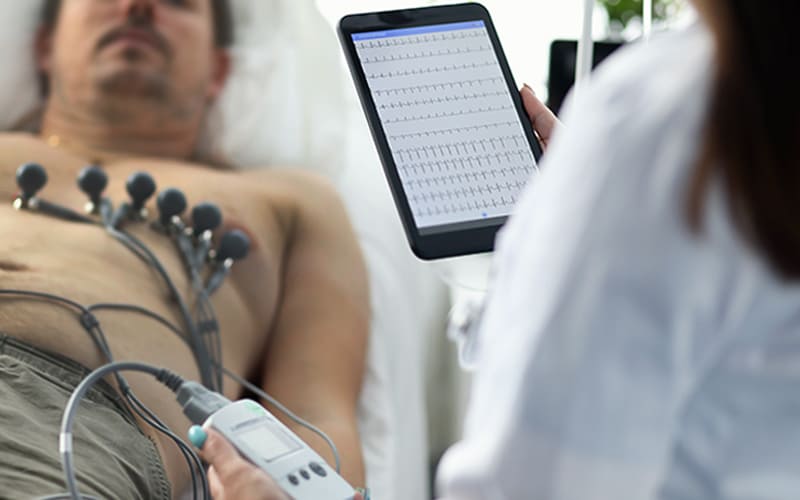COVID 19 and 5 Ways It Can Impact The Heart

As COVID-19 ravages the Chinese city of Shenzhen, with 1000 Omicron cases being reported per day, it’s time to look at some of the long-term effects of COVID-19, especially on the heart.
“COVID-19 is the perfect storm for the heart,” said the World Heart Federation before the pandemic set the world on fire. It is only now that we can appreciate how right they were.
Survivors of COVID-19 are reporting different kinds of heart conditions. From tachycardia to Broken Heart Syndrome, a wide variety of heart problems are affecting the survivors of this deadly disease.
Hence, COVID-19’s effects are far from over and you should continue to monitor your heart health to prevent any untoward happenings.
On that note, the best medicine doctor in Kolkata shares with you the complete impact of COVID-19 on the heart and what you can do about it.
Let’s begin.
COVID and Its Impact on The Heart
There are potentially 5 ways in which COVID-19 can affect your heart. They are:
- Tachycardia
- Heart Attack
- Myocarditis/Pericarditis
- The Broken Heart Syndrome
- Other Problems
Let’s look at each in detail.
- Tachycardia
Post-COVID, many patients have reported an increase in their heart rate. An increase in the heart rate leads to a condition known as tachycardia.
Normal heart rate varies between 60-100 beats per minute, any increase in this number is a potential problem.
Tachycardia, or the increase in heart rate, has been observed in several patients post-COVID-19. This condition can start either in the atria which are the upper chamber of the heart or in the ventricles which are the heart's lower chambers.
For many people, even small amounts of activity are resulting in an increased heart rate of 95-100 beats per minute. For example, walking short distances is causing the heart rate to spike abnormally.
For some patients, this condition is resolving after a while, but for others, it is prolonged. Moreover, heartbeat fluctuations can be fatal for those who have suffered from heart disease previously.
In tachycardia, the heartbeat can be raised to 150-200 beats per minute, causing the heart to pump less blood throughout the body leading to dizziness, and in extreme cases, death.

- Heart Attack
The next outcome of COVID 19 on the heart is an increased heart attack rate. According to a study in Nature Medicine, heart failure and death increased in COVID patients by 4% as compared to those who had not been affected by COVID-19.
Moreover, a study undertaken by Lancet, revealed that in the one week after a COVID-19 diagnosis, the heart attack risk increased by 3 to 8 times. Although the risk rate steadily declined after that, it stayed high for at least a month. Hence, you should get checked by a COVID doctor in Kolkata regularly post COVID-19 infection.

- Myocarditis and Pericarditis
Experts are also linking COVID-19 to heart conditions like Myocarditis and Pericarditis. The World Heart Foundation had advised that the COVID-19 was a pro-inflammatory disease. It can lead to the inflammation of the heart muscles (myocarditis) or the inflammation of the sac containing the heart (pericarditis).
- The Broken Heart Syndrome
This syndrome is triggered by sudden, intense emotional or physical stress which can lead to cardiomyopathy or weakening of the heart muscles. The condition is also known as Takotsubo cardiomyopathy, named after the shape the weakened left ventricle makes when seen on the echocardiograms, resembling a Takotsubo pot used to catch octopi.
This condition affects older women disproportionately and causes the heart to pump blood less efficiently. However, the good news is that this problem does not damage the heart muscle permanently as is the case with a heart attack. People recover within a month and the condition does not typically reoccur.
To treat broken heart syndrome, doctors may prescribe blood thinners for the clots and standard heart failure medication. There is no long term treatment defined. Moreover, people under a lot of stress are more at risk for this condition.
- Other Problems
Experts at Johns Hopkins have said that COVID-19 can affect the condition of inner surfaces of veins and arteries, weakening them, damaging small blood vessels and causing disrupted blood flow to the heart. Post-COVID-19 you can also feel breathlessness, fatigue, shortness of breath, palpitations and dizziness.
Conclusion
Therefore, in conclusion, the post-COVID-19 impact on the heart is very severe.Moreover, you are at greater risk if you had heart issues prior to COVID-19. To sum up, the post-COVID-19 complications include disruptive heart rhythms, blood clots, stroke, inflammation of the heart, coronary artery disease, heart failure, heart attack, and even death.
So, consult the best Medicine doctor to check the condition of your heart. Be careful, say experts and go for ECHO and ECG tests. However, the best way forward, if you are experiencing any of these conditions is to consult a doctor. A doctor should be able to guide you and prescribe medication for each condition.